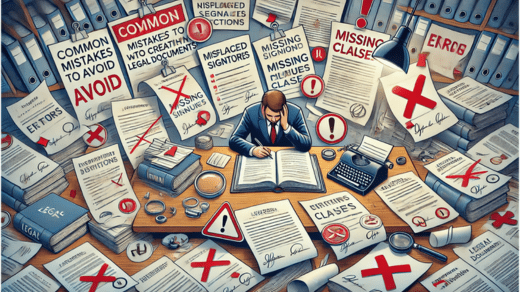Legal documents are an essential part of the legal world. They serve as the foundation for many transactions, agreements, and actions in both personal and professional contexts. From contracts to wills, legal documents help protect individuals, businesses, and organizations by ensuring that all parties involved understand their rights, responsibilities, and obligations. Understanding legal documents is crucial for avoiding disputes, maintaining compliance with laws, and safeguarding interests.
In this article, we will explore the significance of legal documents, the types of legal documents you might encounter, and why it’s important to understand and manage them properly.
What Are Legal Documents?
Legal documents are formal written records that outline the terms, conditions, rights, and obligations of parties involved in various legal processes or agreements. These documents are used to prove, enforce, or formalize actions, agreements, or facts, and are often recognized by courts or legal authorities.
Legal documents come in various forms, including contracts, agreements, deeds, and certifications. They can be used in a range of scenarios, such as business transactions, property purchases, legal disputes, and personal matters like estate planning. Whether you’re entering into a business agreement, buying a home, or drafting a will, legal documents are essential for ensuring that your intentions are clearly outlined and enforceable.
Why Are Legal Documents Important?
Legal documents serve multiple purposes, each of which plays a crucial role in ensuring legal clarity and protecting the interests of individuals and entities involved in any transaction or legal matter. Here are a few reasons why legal documents are important:
- Clarity and Certainty: Legal documents clearly outline the rights and obligations of all parties involved, reducing ambiguity and potential misunderstandings.
- Evidence in Court: In case of disputes or conflicts, legal documents serve as formal evidence that can be presented in court to support claims or arguments.
- Protection of Rights: Legal documents ensure that your rights and interests are protected. For example, contracts can safeguard business interests, and wills ensure that assets are distributed according to the decedent’s wishes.
- Compliance with the Law: Many legal documents are required by law to ensure that individuals and businesses comply with local, state, or federal regulations. Failure to provide proper legal documentation can result in legal consequences.
- Prevention of Legal Disputes: By clearly defining terms, expectations, and responsibilities, legal documents can help prevent conflicts from arising, reducing the risk of costly litigation.
Common Types of Legal Documents
Legal documents come in many different forms, depending on the type of legal issue at hand. Below are some of the most common legal documents you may encounter:
1. Contracts
A contract is a legally binding agreement between two or more parties. Contracts can be oral or written, but written contracts are generally preferred because they provide a clear record of the agreement. Contracts are used in various scenarios, including business transactions, employment agreements, real estate deals, and service agreements.
Key elements of a contract include:
- Offer: One party makes a proposal to another.
- Acceptance: The second party agrees to the terms of the offer.
- Consideration: Something of value is exchanged between the parties.
- Mutual Consent: Both parties agree to the terms freely and without coercion.
Contracts ensure that all parties fulfill their obligations and can be enforced if necessary.
2. Wills and Trusts
Wills and trusts are essential legal documents in estate planning. A will outlines an individual’s wishes regarding the distribution of their assets after death, including designating beneficiaries and appointing an executor. A trust is a legal arrangement where a person (the trustee) holds and manages assets for the benefit of another person (the beneficiary).
Wills and trusts are essential for:
- Ensuring assets are distributed according to your wishes.
- Appointing guardians for children or dependents.
- Minimizing disputes among family members after your passing.
- Managing estate taxes and ensuring that assets are passed smoothly.
Having these documents in place ensures that your estate is handled efficiently and according to your preferences.
3. Power of Attorney
A power of attorney (POA) is a legal document that allows one person to act on behalf of another in legal or financial matters. The person granting the power (the principal) designates someone (the agent or attorney-in-fact) to make decisions or sign documents on their behalf.
There are several types of POA, including:
- General POA: Provides broad powers for the agent to act in all matters on behalf of the principal.
- Limited POA: Grants powers for specific tasks or a limited time period.
- Durable POA: Remains in effect if the principal becomes incapacitated.
POA documents are crucial for individuals who may face incapacitation or for those who need assistance managing their legal and financial affairs.
4. Deeds
A deed is a legal document that signifies the ownership or transfer of property. The most common types of deeds are warranty deeds, which provide a guarantee of clear ownership, and quitclaim deeds, which transfer ownership without any warranties or guarantees.
Deeds are used in:
- Real estate transactions: Buying or selling property.
- Gifting property: Transferring property to another person without a sale.
- Estate planning: Transferring ownership of assets after death.
Deeds are essential for transferring ownership and ensuring that property rights are clear and legally binding.
5. Non-Disclosure Agreements (NDAs)
A non-disclosure agreement (NDA) is a legal contract used to protect sensitive or proprietary information shared between two parties. NDAs are commonly used in business contexts where confidential information, such as trade secrets or business plans, needs to be protected from disclosure to competitors or the public.
Key points of an NDA include:
- Confidentiality: The recipient agrees not to disclose confidential information.
- Duration: The length of time the confidentiality obligation lasts.
- Exemptions: Certain information that may not be covered by the NDA.
NDAs are vital for businesses to safeguard intellectual property and sensitive business information.
6. Employment Agreements
An employment agreement is a legal document that outlines the terms of employment between an employer and an employee. These agreements can cover a wide range of issues, such as compensation, benefits, job responsibilities, confidentiality clauses, and non-compete agreements.
Employment agreements are important for:
- Protecting the employer’s intellectual property and business interests.
- Ensuring employees understand their duties and obligations.
- Clarifying terms of termination and dispute resolution procedures.
Having a well-drafted employment agreement can prevent misunderstandings and legal disputes.
7. Lease Agreements
A lease agreement is a legal document between a landlord and tenant outlining the terms and conditions for renting property. The agreement includes details like rent payment, duration of the lease, maintenance responsibilities, and any restrictions on the use of the property.
Lease agreements are essential for:
- Protecting the rights of both landlords and tenants.
- Establishing clear terms for rent payment and property usage.
- Resolving disputes related to rental agreements.
Properly drafted lease agreements help avoid conflicts and ensure the smooth operation of rental relationships.
Why Legal Documents Must Be Handled Carefully
Legal documents are not just formalities; they are binding agreements that can have long-lasting consequences. Improperly drafted or poorly understood legal documents can lead to costly legal disputes, financial losses, and even criminal liability. Therefore, it is important to:
- Consult Legal Experts: Always seek advice from an attorney when drafting or reviewing legal documents to ensure they comply with the law and protect your interests.
- Ensure Accuracy: Mistakes in legal documents can invalidate them or lead to unintended consequences. Double-check details such as names, dates, and terms.
- Keep Records: Retain copies of all legal documents for future reference. They may be necessary if disputes arise or if you need to prove the terms of an agreement.
Conclusion
Legal documents are essential tools for protecting rights, managing risks, and ensuring compliance with laws. From contracts to wills, powers of attorney to deeds, these documents provide structure and clarity in various legal matters. Understanding the different types of legal documents and their importance is crucial for safeguarding your interests, whether you’re a business owner, homeowner, or individual planning for the future.
When dealing with legal documents, it’s always wise to consult a legal professional who can help you navigate complex matters and ensure that all documents are properly drafted, executed, and filed. By doing so, you can protect your rights and avoid potential legal issues down the road.



